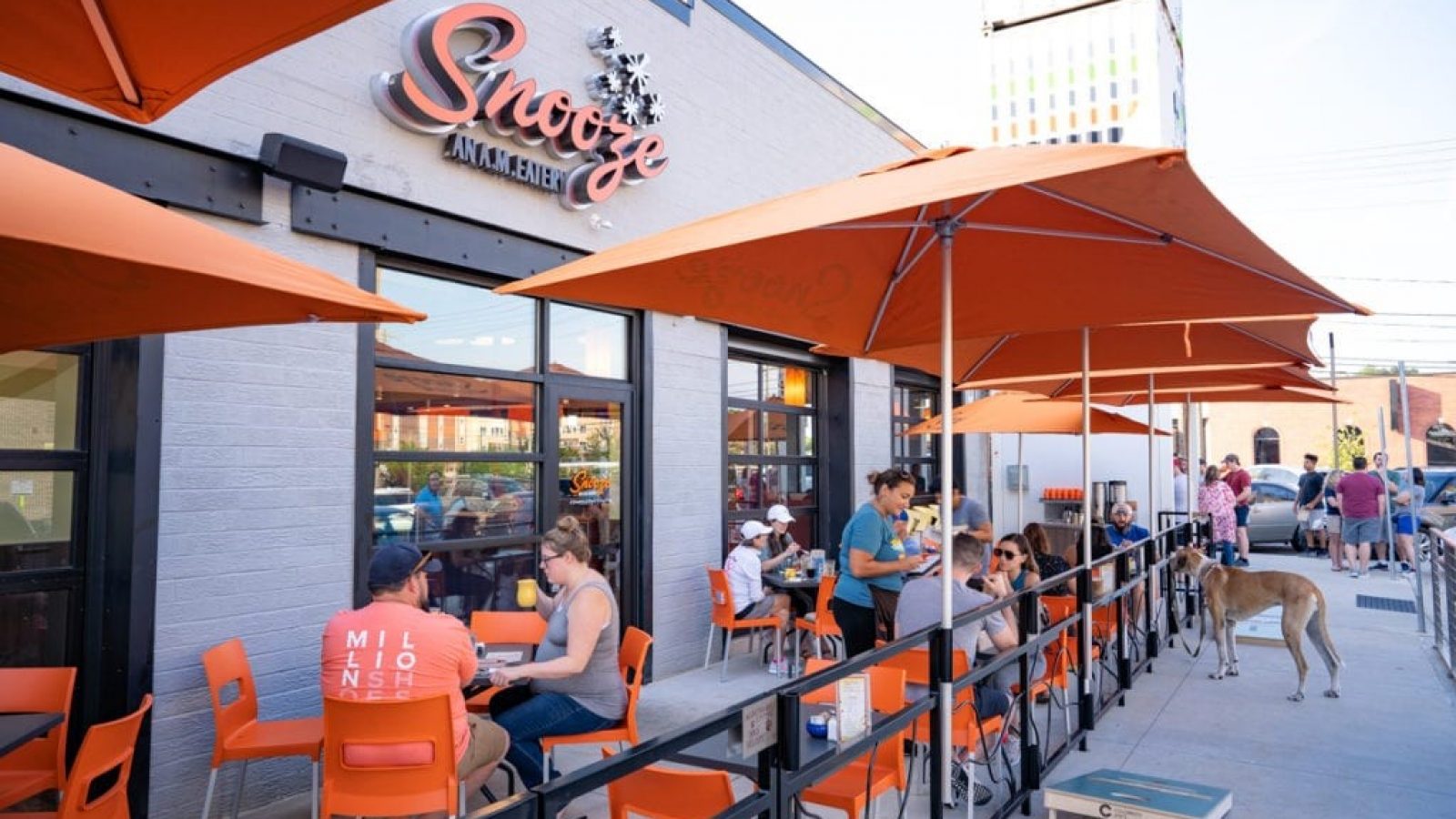Landlords & tenants work together during the COVID-19 crisis

(Nick Ault, the owner of three Duffeyroll locations, considers himself lucky because he received an abatement for one location and rent deferrals for the other two locations for April and May, with June discussions pending. During the shutdown, he’s been able to expand the company’s other business channels, including mail order, catering, delivery and frozen options.)
Landlords & tenants work together during the COVID-19 crisis
Colorado Real Estate Journal – May 2020 Retail Properties Quarterly
Featured Author: Jimmy Balafas, Kentro Group
Over the course of three weeks in March, our lives were turned over forcefully by the tsunami-like winds of a global pandemic. For those who’ve lost loved ones, friends, jobs or any chance of maintaining your business, we are thinking of you during this challenging time. Our team is working daily with 100 or so mostly retail tenants to find common ground that makes sense for everyone. We believe in small business and have staked our reputation on the core ethic of always doing the right thing (even if it’s not to our own best advantage). Here’s how trying to adhere to those principles over the past few months has been working so far.
First, thankfully a good percentage of our portfolio comprises businesses deemed essential during this crisis such as banks, and grocery, liquor and convenience stores. But also we have a slate of daily use businesses that are (just now) attempting to find their way through the complicated maze of deciding whether (or when or how) to resume their enterprises under government guidelines. These include nail and hair salons as well as a variety of retailers and restaurants. In April, we received full rent from 46% of our tenants. Further, 30% paid modified rent, and 24% paid nothing (at press time). For an investment perspective, we collected 69% of total payments due in our portfolio. Despite business reopenings, we expect the coming months to be equally challenging.
I’ll admit publicly that I’m worried, even as the state of Colorado begins to reopen. Like many businesses, we’re looking at our internal strengths and how we might grow or pivot to other segments of real estate investing.
What we’re doing. At press time, we’d traveled the same path as many of you. We:
• Examined all of our tenant’s leases to review terms;
• Reached out to lenders to see what might be possible; and
• Looked at our business insurance policies and helped our tenants do the same.
Like most of you, we’re rooting for restaurant and other business collaboratives that are lobbying to force insurance companies to cover government-mandated closures under business interruption clauses. Class-action lawsuits also are in progress, including businesses seeking indemnity from lawsuits as they begin to open during a still-active pandemic.
We took one line of negotiation that some tenants may have found challenging at first. We insisted, pre-negotiation, that tenants apply for all available assistance, including Small Business Administration Paycheck Protection Program, Economic Injury Disaster Loan and, where applicable, grants from the city of Denver. When possible, we extended to our tenants any breaks our lenders offered to us, yielding rent deferrals minus insurance, taxes and common area maintenance over specific time periods, among other arrangements. Beyond lender options, we have properties with balance sheet reserves that enabled us to help some tenants who were unable to secure any other assistance. But we know we can’t help like this forever.
We also faced some challenges with two noncooperating clients, one of which is an essential business with storefronts and an e-commerce channel. At one point, one of these tenants threatened us in some astonishing ways, which made us feel like we had a target on our back along with the heavy load we’re already carrying. During a crisis like we’ve never experienced before, intractable positions are not good for anyone.
Compromising for mutual benefit. Arriving at a compromise makes good business sense. Both landlords and tenants benefit mutually when everyone comes to the table with an open mind. In the very near future, it could become a tenant-driven marketplace: Many businesses across the country will be forced to shutter, flooding communities with newly available property that might include very generous lease terms from landlords wanting to fill vacancies. No real estate investor wants empty storefronts or strained lending relationships. At the same time, retailers and restaurants who’ve built brand equity in their selected locations might prefer to stay. Customers will find comfort and convenience with their favorite restaurant, retailer or service provider right where they expect it to be. And the expense to relocate and remarket a business somewhere new presents financial, logistical and branding challenges.
Meet a few of our great restaurants tenants. All small businesses are facing a cash crunch, but restaurants may need a special boost. A 2016 research study of 600,000 small businesses from JPMorgan Chase called, “Cash is King: Flows, Balances, and Buffer Days,” noted that, on average, restaurants hold only a 16-day cash buffer – one of the lowest buffers of all industries surveyed – versus high-tech services, which have a 33-day buffer. More than 25% of even smaller businesses hold less than 13 days of cash-on-hand.

(Snooze an A.M. Eatery has 41 locations. The restaurant received rent deferrals at nearly every location but no full-on abatements. At press time, 26 units were open for carry-out and delivery while 15 locations were closed temporarily.)
Snooze and superpower “snoozers.” We have 15 restaurants in our portfolio, four of which have national footprints, including Denver’s beloved breakfast and brunch spot, Snooze an A.M. Eatery. With 41 locations, Phil Weick, Snooze’s vice president, real estate and development, is busy with the same number of landlords, and is facing challenges on multiple fronts. Under the circumstances, he feels like now is an opportunity to build stronger relationships with the property owners.
“I will never forget the landlords that were sympathetic and willing to partner with us when we’re looking for our next site,” Weick said. “Conversely, I will never forget those that turned their back on us.
“We’ve received rent deferrals at nearly every location but no full-on abatements,” he continued. “Our most generous landlord was able to defer rent for three months, payable one month each from 2021 through 2023. Overall, my strong belief is that if any landlord or tenant is just out to win, we all lose.”
But rent deferrals are only one part of this pandemic puzzle. Snooze’s success is experiential, difficult in a carryout/delivery environment. Snoozers – the restaurant’s nickname for its dedicated team members – are one key to its successful formula. The eatery has both regular and special occasion customers for whom the company’s effective team members make each dining experience memorable while solidifying the brand.
Weick’s next, most pressing challenge is how to reopen 41 locations. “We’ve been strategizing about reopening since the shelter-in-place orders began. (At press time), 26 units were open for carry-out and delivery while 15 locations are closed temporarily,” said Weick. “Before this crisis, we had no delivery channel. Like so many others, we’ve had to reconsider our entire operation.”
Weick is a data enthusiast who is weighing the numbers against multiple business scenarios, including:
• What will prospective capacity look like? One of his analyses indicated that a required 6-foot table separation would reduce capacity by 40% to 60%, depending on location.
• With reduced capacity, a menu review is in order. Will items with single-recipe ingredients go by the wayside?
• Will they need plastic partitions in addition to other tools like gloves and masks to protect customers and staff?
• What is the action plan if a Snoozer falls ill or if a customer infection is traced back to one of its locations?
• Could future leases include lower monthly costs with a higher percentage rent to landlords?
Duffeyroll. Nick Ault, the owner of three Duffeyroll locations that serve breakfast and lunch alongside its legendary sweet and savory namesake treats, believes something good always results from a crisis. The COVID-19 sweep has provided him with clarity about how to move forward.
“We are committed to our physical locations where our brand meets our customers every day, but we’ve been working on other business channels for some time,” said Ault. “Our mail order business – featuring bake-at-home Duffeyroll pans – has been increasingly popular with our fans across the country. We’ve sent them to 34 of 50 states so far. Our catering and delivery channels have been robust, and we’re also looking at frozen wholesale dough options. We consider ourselves lucky because the product at the center of our brand is both popular and portable.”
Ault also has been lucky with his landlords. He received an abatement for one location, and deferrals for the other two for April and May with June discussions pending. He has a keen understanding that landlords and tenants are in this situation together.
“We’re getting through this via the great partnerships we have with our landlords, as well as the fact that we secured our PPP loan and have been able to bring the majority of our staff,” he said. “Right now, we’re doing lots of cleaning, among other side projects, so we can hit the
ground running when we resume our dining room operations.”
Tacos, Tequila, Whiskey. Kevin Morrison, owner of Tacos, Tequila, Whiskey (a.k.a. Pinche Tacos) and Fish N Beer, also is rethinking his business. Some of it began before the current crisis: At the close of 2019, he outsourced accounting and human resources. Today, he’s returned to
his roots in the kitchen, which has sparked his creative enthusiasm, while also giving him the opportunity to reconsider his company’s earlier, expansive growth goals.
“I’ve always been ambitious, but this crisis has made me less sure about how much or even if I want to grow larger,” said Morrison. “I’m filled with ideas, but taking out loans to grow no longer interests me. Right now, I’m focusing on the few employees I plan to take care of forever, and pivoting to catering operations and a test with burritos.”
Morrison has been able to work productively with all of his landlords but one, who is demanding full payment (at press time). This has put pressure on savings even while he’s earning limited income. He received his full ask for an SBA loan and said it will help him get through a few more months. As summer draws closer, he’s confident that among his regular customers, millennials will return in droves.
“Dining out is a huge part of this demographic and, in general, most Denverites really love the social experience,” he said. “We can’t wait to greet our customers, no matter what it might look like.”
Calling it early and earnestly. Like everyone, we’re excited to see our tenants’ businesses ramp up slowly, safely and successfully. Our tenant relationships have grown closer through this period and we’ve learned there’s no one we’re in business with who operates just for the paycheck. We discovered a real passion among our internal and external relationships that brings joy in a dark time. This virus has challenged everyone, and we hope we can continue to learn and grow from it.
Featured in CREJ’s May 2020 Retail Properties Quarterly